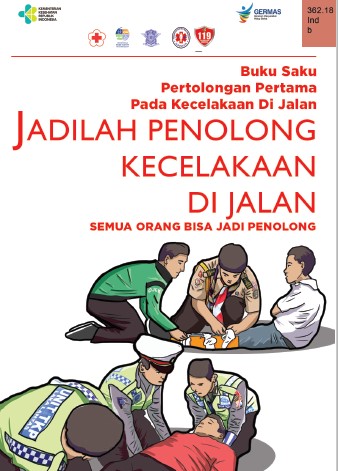According to the WHO Global Status Report on Road Safety, around 12 people for every 100 000 are killed from road traffic crashes across Indonesia every day. About 74% of these victims were riders of two or three wheeled vehicles.
The Indonesian Ministry of Health (MoH), with support from WHO Indonesia, is promoting activities to increase public knowledge and help the community respond to road crashes. A pocket book, titled "Be Active Road Accident Bystanders", has been developed through this initiative to help educate traffic bystanders in the active role they can play to help save lives in the event of a road traffic crash.
The MoH invited relevant stakeholders including Indonesian Scouts, Online-Taxi providers, and experts on medical emergencies and road safety to participate in a series of meetings earlier this year to finalize the draft pocket book. The draft was then successfully trialed in four cities in Java: Cirebon, Cilegon, Tangerang and Bogor. It will now be widely disseminated throughout Indonesia as part of national efforts to promote post-crash management within the community.
The pocket book emphasizes four principles of the bystanders’ interventions which are to:
- Call 119, the Public Safety Center’s emergency hotline
- Secure yourself
- Secure the environment
- Secure the victim
It also presents the general key ‘Do’ and ‘Do Not’ messages that can be applied in most common traffic crashes.
The pocket book has been developed in collaboration with the National Police, Public Safety Center, Indonesian Association of Emergency Medicine, Indonesian Red Cross and Indonesia Road Safety Partnership. It responds to Pillar 5 of the WHO Global Plan for the Decade of Action for Road Safety 2011-2020, which aims to increase responsiveness to post-crash emergencies and provide appropriate emergency treatments for crash victims.
The severity of road crash injuries – even cases of death – can often be lessened by providing quick and appropriate help. Delays in notification, traffic jams or long distances can prolong the time taken for emergency medical personnel to get to the crash site. Therefore, the ability of witnesses or people around the crash site to deliver a rapid first aid response while waiting for medical assistance to arrive can be life-saving.
Caption: The cover of the first aid pocket book developed through a multi-partnership committee to increase awareness on the role of bystanders in response to traffic crashes.
Main image caption: Motorcycles are a common form of road transport in Indonesia. Credit: WHO
